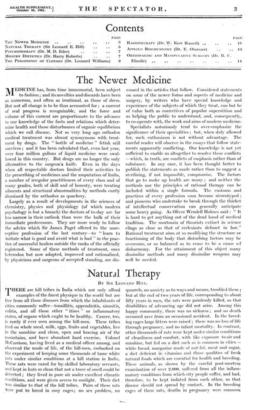The Newer Medicine
MEDICINE has, from time immemorial, been subject to fashion ; and its novelties and discards have been as numerous, and often as irrational, as those of dress. But not all change is to be thus accounted for ; a current of real progress is recognizable, and the force and volume of this current are proportionate to the advance in our knowledge of the facts and relations which deter- mine health and those disturbances of organic equilibrium which we call disease. Not so very long ago orthodox medical treatment was almost synonymous with treat- ment by drugs. - The " bottle of medicine " fetish still survives ; and it has been calculated that, even last year, over four million gallons of liquid medicine were swal- lowed in this country. But drugs are no longer the only alternative to the surgeon's knife. Even in the days when all respectable doctors limited their activities to the prescribing of medicines and the amputation of limbs, a number of irregular practitioners of every class and of Many grades, both of skill and of honesty, were treating ailments and structural abnormalities by methods curtly dismissed by the orthodox as quackery.
Largely as a result of developments in the sciences of chemistry, physics and physiology (of which modern psychology is but a branch) the doctors of to-day are far less narrow in their outlook than were the bulk of their immediate predecessors. They are more ready to follow the advice which Sir James Paget offered to the unre- ceptive profession of the last century—to " learn to imitate what is good and avoid what is bad " in the prac- tice of successful healers outside the ranks of the officially registered. Some of these methods of treatment, once heterodox but now adopted, improved and rationalized, by physicians and surgeons of accepted standing, are dis- cussed in the articles that follow. Considered statements on some of the newer forms and aspects of medicine and surgery, by writers who have special knowledge and experience of the subjects of which they treat, can but be of value both as correctives of popular superstition and as helping the public to understand, and, consequently, to co-operate with, the work and aims of modern medicine.
Specialists notoriously tend to over-emphasize the significance of their specialities ; but, when duly allowed for, such enthusiasm is not without advantage. The careful reader will observe in the essays that follow state- ments apparently conflicting. Our knowledge is not yet sufficient to enable us altogether to resolve these conflicts —which, in truth, arc conflicts of emphasis rather than of substance. In any case, it has been thought better to publish the statements as made rather than to suggest a sterilizing, if not impossible, compromise. The factors that go to make up health are many ; and neither the methods nor the principles of rational therapy can be included within a single formula. The customs and practices of every profession soon become stereotyped ; and pioneers who undertake to break through the thicket of intellectual conservatism can generally anticipate some heavy going. As Oliver Wendell Holmes said : " It is hard to get anything out of the dead hand of medical tradition. The mortmain of theorists extinct in science clings as close as that of ecclesiasts defunct in law." Rational treatment aims at so modifying the structure or functioning of the body that disturbing factors may be overcome, or so balanced as to cease to be a cause o f disharmony. For the attainment of this object many dissimilar methods and many dissimilar weapons may well be needed.


















































 Previous page
Previous page